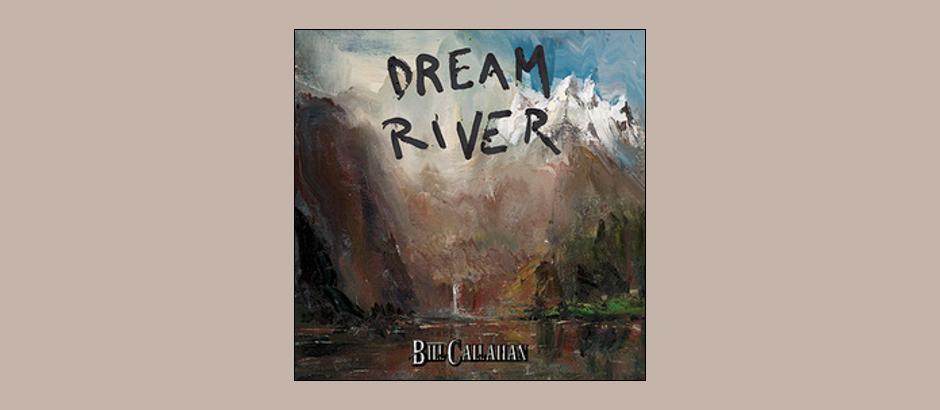Bill Callahan‘s Dream River is evidence of an artist growing more imaginative, more intimate and “ever more comfortable with his vernacular”, says Ian Maleney.
The Sing’ sets the tone. The fiddle is high and clear, steeped in country, the bass firmly in the pocket. It’s the kind of track you could just about get up from a mid-west bar to dance a little to, clutching a bottle of cheap American beer in one hand, but I’ve never been in a mid-west bar, so I don’t know for sure. Callahan narrates in a voice that seems to be watching others do just that though, alternating between brooding self-absorption (“Looking out a window that isn’t there/Looking at the carpet and the chair”) and upbeat hopefulness – “Giving praise in a quiet way, like a church, like a church, like a church that’s far away”.
It’s a charming opening to Bill Callahan’s 18th album and his fourth under his own name. The image of the guy at the hotel bar is so familiar but rarely rendered so well, spoken more than sung in that unmistakable baritone. “The only words I’ve said today are ‘Beer’ and ‘Thank you’”, he says, then repeats, “Beer. Thank you. Beer. Thank you.” It gets a little funnier each time, and a little more sad. Only a man with that voice could get away with it. He compares himself to Marvin Gaye, for his limitations, somewhat like Leonard Cohen in his comic masterpiece, ‘Tower Of Song’. The final lines softly bring to light the thoughts Callahan will spend the next forty minutes exploring; the search, as wild as wind, “for a body, or the means to make one sing”.
As with any Callahan album, it is easy to focus on the voice and the words. His voice is richer and more controlled than ever before, with every slight shading of tone able to add fresh weight to a phrase. He sings slower now, his words emerging one-by-one with gulps of pregnant silence in between, finishing lines half a minute after starting them. Every line is delivered with the impact it needs, whether confessional, conspiratorial or a straight-up joke. The lyrics themselves are a wonder of economy, the words of a man growing ever more comfortable with his vernacular. There is no showing off, no attempt to be obviously dextrous. Instead, familiar words take on new meanings and any old phrase could be lit up from an unexpected angle to be heard afresh. Poetry, in other words.
One of the album’s most striking elements is the absence of traditional drums. Gentle, rolling percussion often serves to keep time but there are practically no drumkits here. The result is a much emptier space, a vacant panorama for the guitars to fill up, which they do with some gusto. Even the quietest guitar has space to breathe and many lead lines are bathed in gorgeous, dubby delays and spirals of reverb. Small flourishes of organ flicker in the bed of tracks, pianos come and go and a flute appears intermittently to great effect.
The guitars are the real stars though, from Callahan’s own quiet, central strumming to Matt Kinsey’s harsh squalls of tremolo that lift ‘Summer Painter’ into the storm the lyrics describe. Kinsey’s guitar is often affected into near-psychedelic territory, phasing, echoing, and played with a healthy dose of the blues. Taken all together, the music has an uncanny feel, moving in a languid, snake-like way that rarely settles into something normal or expected. Through the middle section of ‘Spring’, ‘Ride My Arrow’ and ‘Summer Painter’, the sounds have the same weirdness that runs through the most paranoid dub, a smoke-filled world with shapes in the distance and holes in the floor, a dreamlike haze. Callahan talked about listening to “a lot of reggae and dub from the 70s” in an interview after Apocalypse came out and that influence, the approach to texture and space, is palpable here.
Mark Richardson wrote last year that “Callahan is every straight white male’s ‘still waters run deep’ fantasy”. He is reserved but assured, strong, masculine without showing force, like a Hemingway who doesn’t hate the world. Callahan sounds instead like he’s spent his last few records figuring out how to love it. Apocalypse was riddled with harsh satire which, in light of Dream River, feels now like an expulsion, a final push to rid himself of those feelings. Now the challenge is to be awake and aware, a challenge with Dream River doesn’t so much meet as explore. The title gives it away and on ‘Spring’, he sings “I wonder if I will ever wake up? I mean, really wake up?”. He’s not there yet, but this is a beautiful dream.

